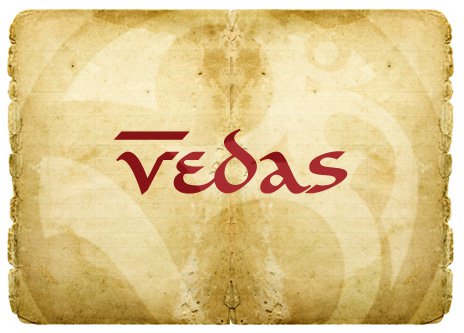Vedas are the most ancient treasure of knowledge India can give to the world. The importance of this vast literature is so evident that it has inspired so many मतानि (loosely translated as religions/line of thoughts) and philosophies. Many schools which reject the supremacy of the Vedas can also be seen. It has inspired so many intellectuals and philosophers of our country and also those who are foreign to us. To be precise, Vedas are the essence and spirit of Indian culture.
When something is so profound and vast disagreements and debates on them are inevitable. While there are various schools of thoughts on the questions like what are Vedas? What is its subject matter? Does it contain anything profound in its verses or is it just hymns and poems praising various gods and goddesses? E.t.c; one basic point of disagreement is what the title of this writing suggests. Were Vedas made by someone? Were they composed?
The very question seems to be a wrong one to a modern mind. How can there be anything which is not made? What would be your reaction if I pick up a book and tell you that this book is written by no one? What does it mean when I say a verse/ sing a hymn and tell you that it was not composed by any individual? Isn’t it a non-starter?
These are exactly the questions an inquiring mind must raise and these are exactly the questions many of our ancient philosophers and modern scholars, Indologists and linguists have raised too. It was just not comprehensible to their minds that a literature can be un-composed. Many came up with their own answers. Their basic proposition was that;
“The Vedas must have been composed by someone, else, it contradicts everything science and linguistics put before us; which is obviously unsustainable.”
Many of them thought the Vedas were composed by god himself. These are the words of god. Others thought these were hymns and poems composed by ancient sages called Rishis. Among many others, these were just hymns composed by priests to chant while performing various rituals.
Any of these seems plausible. These lines of thoughts are popular in scholarly debates and conferences. But, have we made enough efforts to dig into what our ancient philosophers and sages thought and comprehended when they said the Vedas were not composed by anyone.
It is believed that the Vedas are अपौरुषेय which means not composed by anyone; not even by god. It is also believed that the Vedas are अनादि नित्य i.e. without a beginning in time and without an end. At a more theological level, this is on the basis of the premise that वर्ण/ अक्षर are themselves अनादि नित्य and व्याप्त; it follows that the Vedas which are the grouping of अक्षर, are अनादि नित्य too in their definitive order.
Some of the other justifications for the अपौरुषेयत्व of the Vedas are as follows.
“वेदापौरुषेयत्वं च वेदेन एव सिद्दम्”
Which means the eternality of the Vedas is proved by the Vedas themselves, it can also be seen in the following verses:
“वाचा विरुपनित्यया”
“नित्यया नित्यया स्तौमि ब्रह्म तत्परमं पदम्”
“श्रुतिर्वाव नित्या”
“अनादिनिधना नित्या वागुत्सृष्टा स्वयम्भुवा I
नित्योवेदाः समस्ताश्च शाश्वता विष्णुबुद्दिगाः II”
These verses mean that the Vedas are नित्या i.e. eternal which implies that it is not created either.
One more argument can be that if the Vedas are created by one individual or a group of individuals, then, the eternal truths/duties and धर्मा and अधर्मा (loosely translated as rights and wrongs) preached by the Vedas may be disapproved of.
“सर्वसमयाभिमतधर्मादिअसिद्देहे इति”
The classic commentary of Bhagavad Gita by Shri Madhvacharya also advocates the eternality of the Vedas and put forth its argument that if the Vedas are man-made, then the Vedas become fallible because fallibility and prejudices are always associated with man-made things. Hence by approving Vedas to be eternal and not made by anyone, the infallibility of the Vedas can be upheld.
“नह्यपौरुषेये पौरुषेयाज्ञानादयः कल्पयितुं शक्य इति”
If questioned about the verses which tell us Vedas are born, like “ऋचः सामानि जज्ञिरे” and other verses in the Puranas which propagate that the lord created the Vedas, it can be answered that it only means expressed and not born. It can also be said that the divisions in the Vedas (Rig, Yajur, Sama, Atharva) as we see it now was created by the lord (Veda Vyasa) and not the Vedas themselves. The sages/ rishis who are authorities on specific mantras (like Vishwamitra for Gayatri. e.t.c.) are called as मन्त्र द्रष्टारः i.e. one who has seen the mantra and not as one who composed/created the mantras. Hence, another plausible argument would be that the rishis did not compose the Vedas with their conscious efforts but they saw these mantras intuitively with their inner eyes through the deep practice of regular inquiry and deep meditation about god, his creation and its rules and complexities.
Therefore, it is indeed not man made. It can also be stated that there is no evidence on the authorship of the Vedas i.e. there is no one claiming to be the author of the Vedas;
“कर्तृ अप्रसिद्दत्वात्”
It has a long-lasting continuity from times immemorial. Any point in history can be picked and it can still be seen that the Vedas predates that particular point in consideration. Therefore, the eternality of the Vedas has no alternatives.
The authorship of the Vedas remains a flashpoint among the scholars. But, the insight we get of all this remains that the truth of knowledge lies along the path of inquiry. These debates strengthen and reinforce the long-held tradition of inquiry in India, disagreements and debates and does not eclipse the profound stream of knowledge that the Vedas have to offer. These debates are healthy and must be continued but the more fundamental aspect we as a nation must concentrate on is what the father of the cultural renaissance of India Shri Dayananda Saraswati called for; Back to the Vedas.

